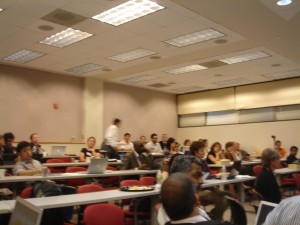Washington Declaration: Harmonization of IP and PI
 Washington Declaration on Intellectual Property and the Public Interest, now available for signature, http://infojustice.org/
Washington Declaration on Intellectual Property and the Public Interest, now available for signature, http://infojustice.org/
The Declaration was drafted by some 180 experts from 85 countries at Global Congress on Intellectual Property and the Public Interest, held at the American University Washington College of Law in Washington, DC on August 25-27, 2011. As the only scholar from China, Prof. Xue attended the Congress and presented at several workshops. She particularly warned the danger of over-expansive of private ordering in IP enforcement.
The Declaration offers a range of recommended actions, aimed at issues such as limitations and exceptions to copyright, reining in IP enforcement, promotion of open access, and implementing development agendas. The declaration has a number of sections, entitled: Putting intellectual property in its place, valuing openness and the public domain, strengthening limitations and exceptions, setting public interest priorities for patent reform, supporting cultural creativity, and requiring evidence-based policy making.
Among the many suggestions in it, several highlighted by the organisers include:
* the use of other legal doctrines, like human rights and consumer protection laws, to cabin intellectual property rights expansion;
* promotion of open access, open educational resources, open government and related open information policies;
* strengthening limitations and exceptions that are needed to promote creativity, innovation and other socially beneficial uses of information and its products;
* setting public interest priorities in patent reform, including a more diverse structure of incentives for innovation;
* supporting cultural creativity through experimentation with new systems to reward and empower authors with, instead of in opposition to, new technologies for information diffusion;
* checking excesses in intellectual property enforcement with more safeguards, procedural fairness and proportionality in enforcement in our courts, at borders and on the internet;
* implementing development agendas, which take account of the economic, social and cultural development interests of all countries, throughout international intellectual property policy making; and
* requiring evidence, “rather than faith or ideology,” to be the core of all policy-making.
The Declaration intends to chart a more positive agenda – “one where the regulatory systems governing information and its products is informed by a fuller range of fundamental values and consideration of the public interest,” as stated by the Organization of WCL.
Global Academy on A2K held the post-Congress meeting in Washington on August 28, 2011. Representatives from Yale, China, Brazil, Egypt and South Africa participated the discussion. Many others, from India or France presented as well. Prof. Xue is leading the Chinese country study project on A2K. Her team is planning to complete the output by the end of 2011.
Permalink Comments off